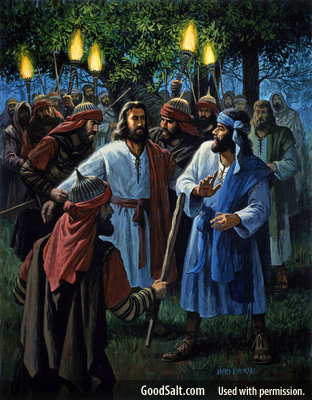“And God said to Moses, ‘I AM WHO I AM.’ And He said, ‘Thus you shall say to the children of Israel, ‘I AM has sent me to you.’ ” Exodus 3:14
We are looking at the five major things we fear that keep us from doing God’s will. Each of these fears is demonstrated in the reaction Moses had when God told him to go back to Egypt to free the Israelites (Exodus 3-4). Last time we looked at Moses’ fear of inadequacy which expressed itself through the question, “Who am I?” (Exodus 3:11). God responded to Moses’ fear with the assurance of His presence (Exodus 3:12a).
Next, we see Moses’ fear of embarrassment when he says to God at the burning bush, “Indeed, when I come to the children of Israel and say to them, ‘The God of your fathers has sent me to you,’ and they say to me, ‘What is His name?’ what shall I say to them?” This fear expresses itself by saying, “I am afraid of looking stupid before all these people if they ask me a question I don’t know the answer to. I am going to feel foolish!” At least Moses was asking the right question.
When we are afraid and God says I have got something for you to do, we don’t ask “Who am I?” We ask, “Who are You?” It is not who we are, it is who God is. Moses says “Who are You God? What’s Your name?”
God’s response is profound! “14 And God said to Moses, ‘I AM WHO I AM.’ And He said, ‘Thus you shall say to the children of Israel, “I AM has sent me to you.” 15 Moreover God said to Moses, ‘Thus you shall say to the children of Israel: “The Lord God of your fathers, the God of Abraham, the God of Isaac, and the God of Jacob, has sent me to you. This is My name forever, and this is My memorial to all generations.” (Exodus 3:14-15).
What does that mean “I AM WHO I AM”? If somebody came to your company’s office and said, “I need to see your CEO.” And you asked him, “Who sent you?” And he said, “I AM WHO I AM.” You would call security to take him away for psychological evaluation. “I AM WHO I AM?”
We need to remember that in the Bible they named people for their character. When God says, “I AM WHO I AM,” what does He mean and how would that relieve my fears? It means four things:
1. It means God EXISTS. God is real. He is not saying, “I was that I was.” Aren’t you glad God is not dead? That is a stress reliever to know that we are not living in a world without Somebody Who is ultimately in control. It is present tense. “I AM WHO I AM.” God is alive. He is not dead. This gives us security especially in a world that seems to be so out of control these days.
2. It means God is ETERNAL. He is timeless. “I AM WHO I AM.” God has been the same forever and He exists forever. God is outside of time. He can see the past and the present and the future all at once because God has created time. He is not surprised by tomorrow’s headlines.
3. It means God is TRUE. When God says, “I AM WHO I AM,” He is not saying, “I am what you want Me to be.” God is saying, “I am My own character.” The problem today is God made us in His image and today people try to make God in their image. On TV talk shows, people say “I like to think of God as…” So what? You are just guessing. What matters is not what you think God is. What matters is Who He really is. The Bible reveals the true character of God. We live in a world where the Devil deceives people into thinking God is made in our image instead of us being made in His image.
4. It means God DOESN’T CHANGE. When God says, “I AM WHO I AM,” He does not mean, “I am what I used to be” or “I am not what I am going to be.” He says, “I AM WHO I AM.” He is unchanging. In a world that is constantly changing, we need Someone in our lives who remains the same. And that Person is God Himself!
These four things about God are enormous fear relievers when you understand there is a God. He is eternal. He always tells the truth, and He never changes. God is the only thing in our lives that does not change which is the only foundation for a fear-free life. The world changes, we change, our relationships change. If we build our lives on anything else except God we are going to live in constant fear of the next change, the next tension, the next stress, the next loss. Only God is unchanging. The more we know God, the less we are going to be afraid because God is the antidote to fear.
Therefore God says, “10 Fear not, for I am with you; be not dismayed, for I am your God. I will strengthen you, yes, I will help you, I will uphold you with My righteous right hand… 13 For I, the Lord your God, will hold your right hand, saying to you, ‘Fear not, I will help you.’” (Isaiah 41:10, 13). God’s unchanging presence in our lives is is foundational to defeating our worst fears. We were never meant to do life alone. Take time today to get to know the Self-Existing God Who said, “I AM WHO I AM.”
The best way to get to know “I AM WHO I AM,” is to get to know Jesus Christ. Jesus made several “I AM…” statements in the gospel of John to demonstrate that He is the same God Who spoke to Moses at the burning bush. Jesus said:
– “I am the bread of life.” John 6:35
– “I am the light of the world.” John 8:12
– “I am the door.” John 10:9
– “I am the Good Shepherd.” John 10:14
– “I am the Resurrection and the Life.” John 11:25
– “I am the Way, the Truth and the Life.” John 14:6
– “I am the true Vine.” John 15:1
When we look at Jesus Christ, we are looking at God in human flesh. To see Jesus, is to see God because Jesus is a perfect reflection of God the Father. This is why Jesus told Philip, “Have I been with you so long, and yet you have not known Me, Philip? He who has seen Me has seen the Father; so how can you say, ‘Show us the Father’?” (John 14:9). This also explains why Jesus said, “He who believes in Me, believes not in Me but in Him who sent Me. And he who sees Me sees Him who sent Me.’ ” (John 12:44-45). Christ is a perfect reflection of God the Father because He has the same divine nature as His Father.
To know God more intimately as the great “I AM WHO I AM,” we must begin a relationship with Him through Jesus Christ. The Bible tells us we must recognize our need for a Savior. Romans 3:23 tells us that “all have sinned and fall short of the glory of God.” We all have disobeyed God with our thoughts, words, and actions. The penalty for our sin is “death”or separation from God (Romans 6:23). We all deserve to be separated from God forever in the lake of fire (Revelation 20:15).
But God does not want us to die forever in hell, so He sent His only Son, Jesus Christ to earth to die for our all our sins and rise from the dead (I Corinthians 15:3-6). Only Jesus can save us because only Jesus has paid the penalty for our sins in full when He died and rose from the dead.
God now invites you to believe or trust in Christ alone for His gift of everlasting life. “He who believes in the Son has everlasting life; and he who does not believe the Son shall not see life, but the wrath of God abides on him.” (John 3:36). Look at the eternal contrast here. The one who believes in Jesus “has”everlasting life. The one who does not believe in Jesus has God’s “wrath” that “abides” on him forever! The decision is yours: Believe or not believe in Jesus? Heaven or hell? The moment we believe in Jesus we are saved from hell forever (Acts 16:31) and we have eternal life which can never be lost (John 10:28-29). Christ guarantees that no one can snatch a believer out of His and the Father’s hands. We are secure forever the moment we believe in Jesus for His gift of eternal life.
After you come to faith in Jesus, get to know Him by talking to Him through prayer (Philippians 4:6-7) and listening to Him as you read and apply the Bible (2 Timothy 3:16-17; James 1:22). Take time to love and be loved by hanging out with other Christians (Hebrews 10:24-25). And begin telling others who do not know Christ, how they can begin a personal relationship with Him (Matthew 4:19).
Prayer: Father God, thank You so much for Your response to Moses when his fear of embarrassment came out. When You said, “I AM WHO I AM,” You affirmed that You truly do exist, and You are eternal. Nothing takes You by surprise. You always tell the truth, and You never change. You are the only thing in our lives that does not change which gives us a solid foundation for a fear-free life. The world changes, we change, our relationships change, but You do not change. The more we know You through the Lord Jesus, the less we are going to be afraid because You are the antidote to fear. Thank You, Father, for revealing Yourself to us through Jesus. Please lead us into a more intimate relationship with You. In the loving name of Jesus Christ, we pray. Amen.










